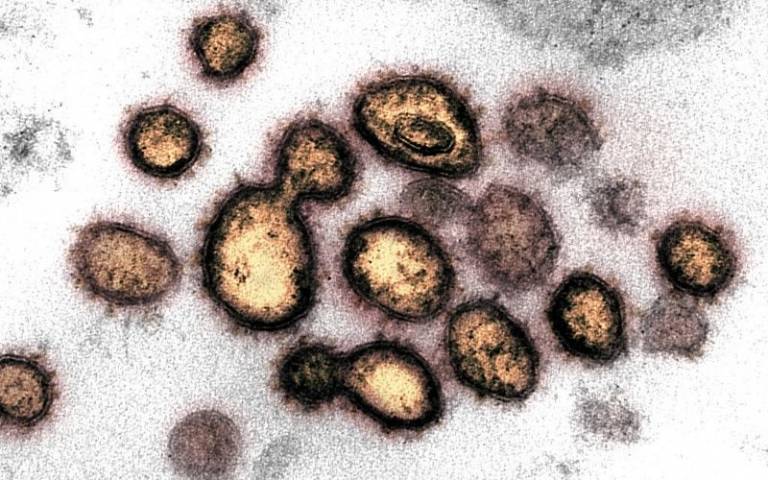Common cold antibodies could help protect against COVID-19
9 November 2020
Some antibodies created by the immune system during infection with common cold coronaviruses can also target and provide a degree of protection against COVID-19, finds new research by scientists at UCL and the Francis Crick Institute.

In response to infection with a virus, the immune system creates antibodies to help fight it. These antibodies remain in the blood for a period after infection, and in the case of re-infection, they are able to tackle the virus again.
In the research, published in Science, scientists found that some people, notably children, have antibodies reactive to SARS-CoV-2 in their blood, despite not ever having being infected with the virus. These antibodies are likely the result of exposure to other coronaviruses, which cause a common cold and which have structural similarities with SARS-CoV-2.
The researchers made this discovery while developing highly sensitive antibody tests for COVID-19. To see how well their assay tests were performing, they compared the blood of patients with COVID-19 to patients who had not had the disease. Surprisingly, they found that some people who had not been exposed to SARS-CoV-2 had antibodies in their blood which would recognise the virus. To confirm their findings, they analysed over 300 blood samples collected before the pandemic, between 2011 and 2018.
Nearly all samples had antibodies that reacted with common cold coronaviruses, which was expected given how everyone has been exposed to these viruses at some point in their lives. However, a small fraction of adult donors, about 1 in 20, also had antibodies that cross-reacted with SARS-CoV-2, and this was not dependent on recent infection with a common cold coronavirus.*
Notably, such cross-reactive antibodies were found much more frequently in blood samples taken from children aged 6 to 16.
Lead author, Kevin Ng, PhD student in the Retroviral Immunology Laboratory at the Crick, said: “Our results show that children are much more likely to have these cross-reactive antibodies than adults. More research is needed to understand why this is, but it could be down to children being more regularly exposed to other coronaviruses.
“These higher levels we observed in children could also help explain why they are less likely to become severely ill with COVID-19. There is no evidence yet, however, that these antibodies prevent SARS-CoV-2 infection or spread.”
In the lab, the researchers tested the antibodies they found in blood from uninfected people to confirm they are able to neutralise SARS-CoV-2. They found the cross-reactive antibodies target the S2 subunit of the spike protein on the surface of the virus.
Senior author, Professor George Kassiotis, group leader of the Retroviral Immunology Laboratory at the Crick and Honorary Reader at UCL Infection & Immunity, said: “The spike of this coronavirus is made of two parts or subunits, performing different jobs. The S1 subunit allows the virus to latch onto cells and is relatively diverse among coronaviruses, whereas the S2 subunit lets the virus into cells and is more similar among these viruses. Our work shows that the S2 subunit is sufficiently similar between common cold coronaviruses and SARS-CoV-2 for some antibodies to work against both.
“It was previously thought that only antibodies to the S1 could block infection, but there is now good evidence that some antibodies to S2 can be just as effective. This is exciting as understanding the basis for this activity could lead to vaccines that work against a range of coronaviruses, including the common cold strains, as well as SARS-CoV-2 and any future pandemic strains.”
“But it is important to stress that there are still many unknowns which require further research. For example, exactly how is immunity to one coronavirus modified by exposure to another? Or why does this activity decline with age? It is not the case that people who have recently had a cold should think they are immune to COVID-19.”
Co-author, Professor Lucy Wedderburn, Director of the Centre for Adolescent Rheumatology Versus Arthritis at UCL, UCLH and GOSH and lead of the MRC-funded CLUSTER Consortium for childhood arthritis said: “We were delighted to collaborate with the researchers at the Crick in this important study, especially since we know that children seem to suffer far less from the SARS-CoV2 virus.
“Importantly the work with Professor Kassiotis and his team is ongoing, to find out whether our patients with arthritis and related rheumatic diseases also have these protective antibodies from previous coronavirus infection, that could help to protect them against COVID-19.”
A large study is now underway by researchers at UCL, the Crick and Imperial College London, to uncover the role that different antibodies and other immune defences play in protection against COVID-19 and how severely ill people become.
Links
- Research paper published in Science
- Professor Lucy Wedderburn’s academic profile
- Professor George Kassiotis’ academic profile
- UCL Infection & Immunity
- UCL GOS Institute of Child Health
- UCL Medicine
- UCL Centre for Adolescent Rheumatology Versus Arthritis
- The Francis Crick Institute
Image
- Electron microscope image shows Novel Coronavirus SARS-CoV-2, credit NIAID
Source
- The Francis Crick Institute
Media contact
Henry Killworth
Tel: +44 (0) 7881 833274
E: h.killworth [at] ucl.ac.uk
 Close
Close

